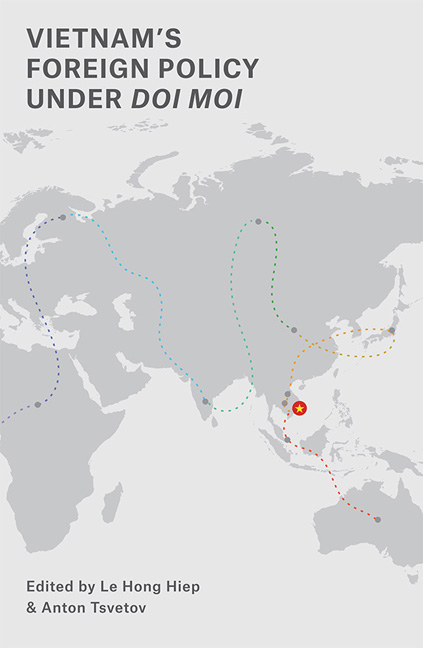Book contents
- Frontmatter
- Contents
- List of Tables
- List of Figures
- List of Abbreviations
- Acknowledgements
- About the Contributors
- PART I ANALYTICAL AND HISTORICAL FRAMEWORK
- PART II BILATERAL RELATIONSHIPS
- 3 The Evolution of Strategic Trust in Vietnam–U.S. Relations
- 4 The 2014 Oil Rig Crisis and its Implications for Vietnam–China Relations
- 5 Vietnam–Japan Relations: Moving beyond Economic Cooperation?
- 6 The Reinvigoration of India–Vietnam Partnership under Prime Minister Modi
- 7 Vietnam–Russia Relations: Glorious Past, Uncertain Future
- 8 Vietnam's Foreign Policy Towards its Smaller Neighbours
- 9 Vietnam's Decision to Join ASEAN: The South China Sea Disputes Connection
- PART III MAJOR FOREIGN POLICY ISSUES
- Index
6 - The Reinvigoration of India–Vietnam Partnership under Prime Minister Modi
from PART II - BILATERAL RELATIONSHIPS
Published online by Cambridge University Press: 04 July 2018
- Frontmatter
- Contents
- List of Tables
- List of Figures
- List of Abbreviations
- Acknowledgements
- About the Contributors
- PART I ANALYTICAL AND HISTORICAL FRAMEWORK
- PART II BILATERAL RELATIONSHIPS
- 3 The Evolution of Strategic Trust in Vietnam–U.S. Relations
- 4 The 2014 Oil Rig Crisis and its Implications for Vietnam–China Relations
- 5 Vietnam–Japan Relations: Moving beyond Economic Cooperation?
- 6 The Reinvigoration of India–Vietnam Partnership under Prime Minister Modi
- 7 Vietnam–Russia Relations: Glorious Past, Uncertain Future
- 8 Vietnam's Foreign Policy Towards its Smaller Neighbours
- 9 Vietnam's Decision to Join ASEAN: The South China Sea Disputes Connection
- PART III MAJOR FOREIGN POLICY ISSUES
- Index
Summary
Bilateral ties between Hanoi and Delhi have been on the upswing in recent years with a focus on strategic cooperation and trade. While Vietnam sees India as a natural ally, India also treats Vietnam as one of its trusted and privileged partners. The strengthening of bilateral ties mainly results from changes in the two countries’ foreign policy agenda that aim to respond to shifts in the geostrategic landscape of the Indo-Pacific region.
The current chapter examines the drivers of the deepening partnership between India and Vietnam. It posits that the elevation of the India–Vietnam Strategic Partnership to a Comprehensive Strategic Partnership in September 2016 is a natural outcome of the increasing convergence of the two countries’ strategic interests and can contribute positively to the regional stability and prosperity.
The chapter starts with an introduction of India's foreign policy under the government of Prime Minister Narendra Modi, followed by a brief background of India–Vietnam relations. The chapter then analyses drivers of recent developments in bilateral ties and the various measures that both sides have taken to improve their relationship. Finally, the chapter concludes by assessing the implications of the deepening bilateral ties for the broader region.
India's Foreign Policy under Modi
As one of the fastest growing economies in an increasingly interdependent world, India has been pursuing an active international economic integration agenda, which has enabled the country to benefit from a wide range of economic engagements. At the same time, India's rising economic clout and diplomatic dynamism have uplifted its global status, bringing about remarkable transformations in the country's foreign policy. India now stands at a critical juncture, preparing itself to become a responsible stakeholder in the emerging global and regional economic and security architectures. The direction and key elements of Indian foreign policy are driven by both India's national interests and the political ideology of the party in power.
- Type
- Chapter
- Information
- Vietnam's Foreign Policy under Doi Moi , pp. 117 - 140Publisher: ISEAS–Yusof Ishak InstitutePrint publication year: 2018



